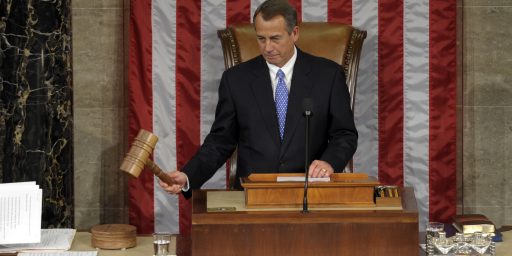Congress Has Abdicated Its Constitutional Responsibility In The War Against ISIS
Speaker Boehner wants to delay a vote on the ISIS war until January, but any such debate will be meaningless because Congress has already abdicated responsibility.
Late last week, House Speaker John Boehner endorsed the idea of holding a Congressional vote to authorize the President’s war against ISIS, but said that he preferred waiting until the new Congress takes office in January to do so:
With American airstrikes in Syria continuing, Speaker John A. Boehner is increasingly convinced that Congress must hold a full debate on granting President Obama the authority to use military force against terrorists.
“I have made it clear that I think the House and the Congress itself should speak,” the speaker said in an exclusive, wide-ranging interview with First Draft.
But Mr. Boehner believes a post-election, lame-duck session is the wrong time for such a weighty decision.
“Doing this with a whole group of members who are on their way out the door, I don’t think that is the right way to handle this,” he said.
Mr. Boehner, who is open to a more expansive military campaign to destroy the Islamic State, thinks lawmakers should take up the issue after the new Congress convenes in January.
At that time, he said, President Obama should come forward with a proposal for consideration.
Some critics have called on Congress to assert itself more forcefully as the country goes to war, though Mr. Obama has said he does not need lawmakers’ approval for the operation.
“I would suggest to you that early next year, assuming that we continue in this effort, there may be that discussion and there may be that request from the president,” he said.
One some level, there is merit to Boehner’s idea that a Lame Duck Congress, which will include many members who are either retiring at the end of the year or who will have been voted out of office, is not the appropriate body for debating and voting on a resolution to commit the nation to a war that could last years and may not actually have any kind of identifiable ending. The reasoning is similar to those that I made note of when I wrote about the question of a Lame Duck Senate voting on the confirmation of a new Attorney General but, for rather obvious reasons, this is a far more serious than what is, in the end, just a standard Presidential appointment of a Cabinet-level officer. Debating and declaring war are two of the most serious duties that Congress is granted by the Constitution and there does seem to be something unseemly about people who will no longer be answerable to the voters, who were in fact rejected by the voters, being the ones who vote on it. Additionally, holding such a debate after the elections but before the new Congress convenes prevents newly elected members of the House and Senate, who indeed will have been just elected by the voters, from participating in the debate or having a vote. Arguably, that deprives the tens of millions of people who will be voting in the midterm elections from having a meaningful say on an issue that could affect the country for years and years to come. So, on some level, I think Boehner is right to want to delay a vote on authorization until the new Congress takes office.
There’s just one problem with Speaker Boehner’s position, and it has to do with the fact that he could have scheduled a vote before the midterm elections, or even reconvened Congress before Labor Day to give members time to adequately debate this issue, if he wanted to:
The Times is presenting this as a sign that Boehner is really, seriously, going to hold a vote on war, whether or not the President makes a formal authorization request. That’s nice, but the really noteworthy thing here is the lack of urgency. You have to love the idea that this is too “weighty” a decision to make during the lame duck session, but not “weighty” enough to vote on before the escalation actually launched, let alone before an election in which voters deserve to know where lawmakers stand on a matter of such great consequence.
To be clear, this is a bipartisan leadership failing. Democratic Congressional leaders have also dropped the ball here, claiming Obama has the authority to escalate without Congressional approval, in order to do the President’s bidding. Meanwhile, the Obama administration has offered no credible rationale for failing to seek authorization.
It’s not surprising that the situation has played out this way, of course. Members of Congress faced with re-election, and party leaders concerned with their party’s fate on the national level in November, would just as soon avoid any potentially controversial votes prior to Election Day, and there are few things that Congress deals with that have more potential for controversy and voter blowback than a vote authorizing a war without any end in sight. In addition to those political incentives, though, this is yet another example of the Congressional abdication that has allowed the Presidency’s powers to expand over the years, especially in the area of foreign policy. As Matthew Yglesias pointed out in a piece in 2011 in advance of the Libya intervention, even leaving aside the issue of Congress declaring war, the Constitution gives Congress potentially huge power over foreign and military policy by virtue of the power of the purse. Despite this fact, and even in the case of military adventures that were opposed by significant numbers of Americans, Congress has largely failed to assert its power at all and has instead become something of a rubber stamp for funding requests from the Executive Branch rather than using their powers to assert a stronger Congressional voice on war policy. Since this is behavior we’ve seen from the Legislative Branch regardless of which party is in control, it’s likely something that will continue for the foreseeable future regardless of who happens to be in charge.
Even if Congress did vote during the Lame Duck session, though, it almost seems as though it may be too late for members to have any meaningful impact on the debate over war policy. The President began bombing ISIS positions in August. Since then, we have seen him escalate from a humanitarian mission to one designed to aid the Iraqi Kurds, and, now, to a strategy to somehow “degrade and destroy” ISIS that has expanded the war into a second country. Even if Congress gets around to voting on this in December, the U.S. will be so far committed to the mission that the President unilaterally laid out that it will be hard to simply back down and say no. By definition, that means that there would not be a legitimate debate on the mission itself, and that would even be more true if it happened with a Lame Duck Congress. So, in some sense, Boehner is right that it should be the the 114th Congress that decides this issue at this point, but because of his own failure to bring this matter before Congress sooner that debate will be essentially meaningless anyway.







I agree that Congress should be on the record – now – concerning ISIS.
However the fact that Congress will not go on the record now is largely the result of congressional Republican leadership. Also, perhaps unintended by Boehner, a side result is that this lets Democratic politicians off the hook – they can blame the president if the airstrikes against ISIS result in blowback in the form of attack on American embassies or consulates in the region.
Hey, remember when us DFHs said the same thing about W Bush invading Iraq? Remember how much weight being correct carried back then? Now that that precedent has been set (thanks, spineless Congressional Dems), the Congress has no incentive to even go on the record with their opinions about the US going to war anymore, let alone demanding involvement in the process. That ship has sailed, maybe forever.
It’s not surprising, just disappointing.
Also, way to steal my line about Congressional abdication and turn it into an excellent post, Doug.
There are two Houses of Congress, and there’s no rule saying that this authorization has to start in the House of Representatives. There’s no reason why the Senate can’t get the ball rolling.
Unless, of course, you want to bring up the funding issue, but the War Powers Act explicitly says that “authorizing funding” does NOT count as Congressional approval.
And has Obama done anything that could count as “consistent with” the War Powers Act? He’s well short of the 60-day deadline when he HAS to, but there’s nothing that says he can’t give notification prior to that.
Oh get over your simpleton political vision. This is well executed, old school politics in action. The GOP is doing just fine handing the O what he wants to proceed in the OISIS war — giving him enough rope for him to hang himself or something akin to that.
In the O-ISIS war, once the ball is rolling, much of what happens will be out of his control for the near future. The O won’t be able to significantly change it’s direction without GOP approval, which can be directed by putting a finger in the winds of public opnion. Basically, he won’t be able to get anything done unless he dances to the tune of the lastest GOP jig.
The O’s weakness that created this mess can finally be used as political leverage to get all sorts of stuff done that a GOP Congress (House and Senate) might not otherwise be able to achieve.
Translation = King Putt will spend more and more time on the golf course in his last years and his burrOcrats and legislation by executive Oclaration will be stymied.
@Seipherd:
Oh cool! I read the Blaze too.
Rachel Maddow is keeping a whip count of members who’ve said they want to come back and vote: 10 Democrats, 3 Republicans and one Independent. 14 total, out of both houses. I believe that is 2.6% of the members.
And there it is, teetering on the line between comedy and tragedy.
@michael reynolds:
Of course. The last thing they are interested in is actually fulfilling their constitutional duties. They have elections to win. Sheesh man, cut them some slack …
😀
Speaker Boehner is clearly in accord with the Obama war in Iraq/Syria. The vast majority of incumbents win re-election. The idea that a lame duck session vote would be repudiated by the next Congress is preposterous.
Of course, this way the speaker can have it both ways. By January it will be pretty clear whether this war was a good idea or not. He’ll be able to vote yes if things are looking good or wring his hands if things go south. In the mean time, he’ll be able to wrinkle his brow and be very concerned.
This is your democracy, folks.
I just went back and read Doug’s article more carefully. The only mentions of the Senate are in passing, and no mention of Harry Reid at all. All of the blame is pushed on the House and Boehner.
Doug, you ARE aware that there are two Houses in Congress? That the power to declare war (or its equivalent) is NOT assigned to either House as an exclusive power? And the Democrats control the upper House?